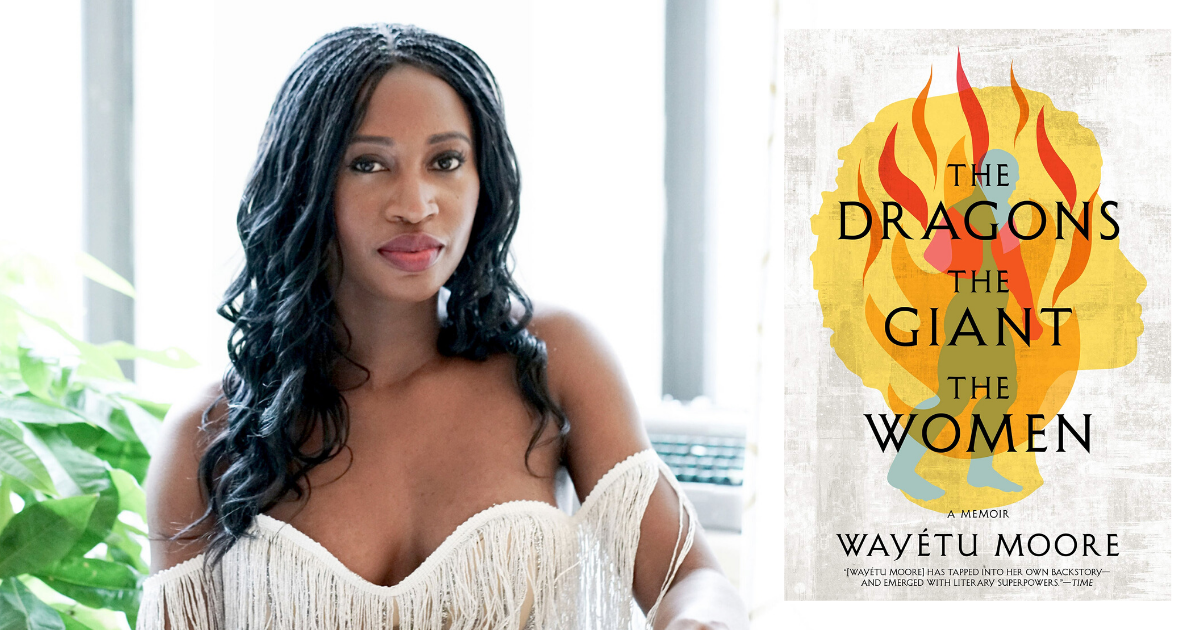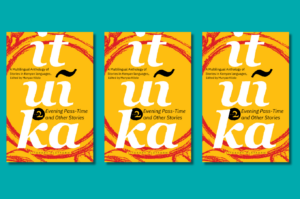
Wayétu Moore burst onto the literary scene two years ago with She Would Be King, a novel that, in retelling the story of Liberia’s founding, explores how “tragic experience tips into magic and pushes the body far, far beyond, into something superhuman.” There is something of this theme, the transformative potential of trying experiences, in Moore’s new memoir The Dragons, the Giant, the Women. The book begins by narrating her family’s escape by foot from the horrors of the Liberian civil war. But it then goes on to recount her experiences acclimatizing to life in America as an immigrant and a black woman — experiences which were sometimes, as Moore writes, “more traumatic than the war.” As such, the memoir — in the words of a recent The New York Times review — “adds an essential voice to the genre of migrant literature, challenging false popular narratives that migration is optional, permanent and always results in a better life.”
Moore’s memoir was published on June 2, 2020. An excerpt of the memoir, focused on her family’s flight out of Liberia when Moore was a child, was recently made available on Literary Hub. Enjoy this taster of Moore’s lyrical prose.
**************************
I had been at the edge of those woods many times before, but Torma or Korkor always stopped me from going farther. The woods were not for small small girls, they would say. There were some good things there, like almond trees and a looming plum tree Moneysweet picked from during the dry season, and we would wait at the edge of those mazes for what felt like an entire afternoon until he reemerged with a netted basket full of juicy red and orange plums, each as big as two fists. But we had heard stories of the badness of the woods too. Like Bendu Sudan. Like the dragons, smaller than Hawa Undu, scaly green creatures with sharklike teeth that even the bush-meat hunters were afraid to challenge. Like the boogeyman and devils. Like the Monkey Men who they say were made by scientists from America and Europe, to see if monkeys and people could fall in love, and were set free in the jungle to live in the mental wasteland of being half monkey and half people way too poor, too joyless to be rescued from surrendering their dignity. Like the children my aunty said work all day in the woods in Harbel tapping tapping tapping the Firestone trees until rubber snailed its way out to be packed in ships and sent to America—these children with no smiles, no stories of yesterday to tell, who had not eaten for so long that she once drove by Harbel and could not tell if they were still children or still people at all.
All these things I had heard of these woods, and now the woods were all around me—whispering to us at first, then laughing as the birds slapped the tree branches above our heads in hurried flight. There was a sound like a first raindrop hitting an empty bucket, the hardest rain, loud and too many drops to count. And a sound like thunder, in the kind of storm that the clouds send when they are jealous of those below.
“What is that?” I asked Papa, the popping still around us. We were walking so quickly and his skin was wet with sweat. He moved branches out of the way so that Ol’ Ma’s path would be clear. He moved branches that made the faces of grieving men.
“Drums,” Papa said. “That’s a drum.” And Torma and Ol’ Ma glanced at him, then looked away, and I felt like I had learned something I was not supposed to know, like that the drums were secret or magic.
“I hear another one,” K said and Papa was shaking as we ran. In the distance we heard yelling each time we heard the drum, and the air became smokey, as if something was burning on the stove, and cars were honking, and in the distance people were shouting and the sound of those drums came nearer.
“That’s Malawala Balawala?” K asked, sobered a bit by the thought of festival dancers celebrating not too far away.
“Yes,” Papa said, panting heavily. “Gbessie Kiazolu is dancing to the drums with the Malawala Balawala country dancers.”
“There’s another!” K shouted. I heard it too. It was so loud that I felt the sound behind my eyes. People were running on the road when we left our house, not just us, but it felt like we were alone. Papa and Ol’ Ma, Torma and my sisters and me. I missed Mam and if we did not go back to our house, we could not see her if she came back. So I cried.
“Sh, sh,” Papa said, tapping my leg.
“The people will hear us-oh,” Torma warned.
“What people?” Wi asked, turning to face Torma.
“The bad people,” she answered.









COMMENTS -
Reader Interactions